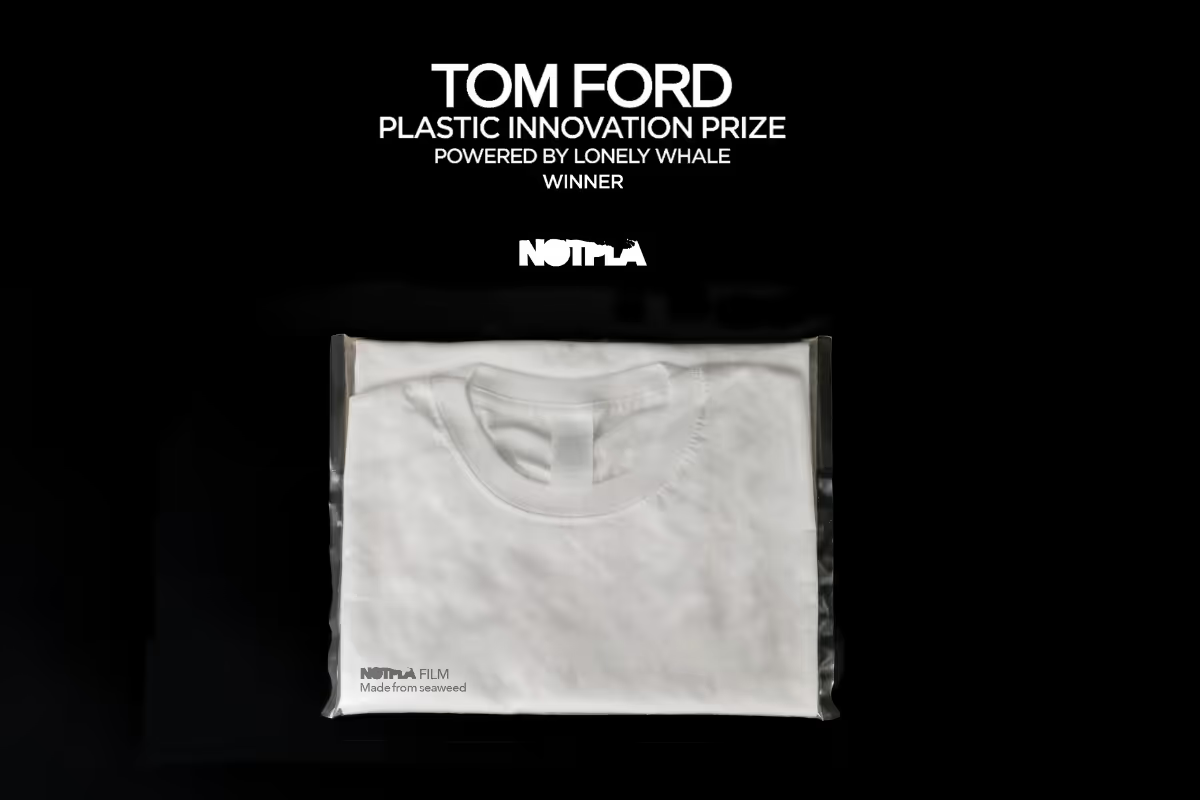
In 2020, the fashion designer and art film director, Tom Ford, partnered with Lonely Whale to launch the TOM FORD Plastic Innovation Prize, the first global competition focused on catalysing scalable and biologically degradable alternatives to conventional plastic polybags made from fossil fuel or biofuel feedstocks.
Over the last year, our alternative to fossil fuel-based thin-film polybags, Notpla Film, went through meticulous tests. Our material even ended up in a simulated whale's gut at the Seattle Aquarium! - to evaluate whether our materials would biologically break down in the environment.
Following the announcement of the three winners at the Green Carpet Fashion Awards (GCFA), Mr Tom Ford said:
"Watching the brilliant minds within this competition has given me extraordinary hope in making the impossible possible. Our three winners have created truly viable alternatives – alternatives that when scaled across markets and industries will drastically change the course of the health of our planet".
Traditional plastic films are made from fossil or biofuels. Globally, humans are estimated to use over 300 billion polybags and single-use, resealable sandwich and storage bags (SRPBs) made from fossil fuel-based materials every year. These bags are almost impossible to recycle — they end up in landfills, on the ground or in our oceans.
Because thin-film plastic is a high-volume, low-value product, it makes many circular economy approaches challenging and the unit economics inhospitable for new recycling approaches. That's why Lonely Whale, alongside TOM FORD Plastic Innovation Prize partners, which includes Nike, Stella McCartney, HP, or J.Crew, believes the most impactful approach for tackling thin-film plastic right now is through material innovation.
The challenge is massive, and we must act now to stop disrupting our planet. You will find below some figures shared on TOM FORD Plastic Innovation Prize website to show the scale of the problem:
With all the greenwashing occurring within the packaging industry, TOM FORD and Lonely Whale decided to go far beyond the standard biodegradability test. Instead, they run a unique biologically degradable assessment process.
Biologically degradable materials will break down and degrade when placed in various contexts at the end of their useful life, such as in landfill, in soil, in the ocean, and in compost. Materials would further need to not produce any toxic byproducts as they degrade, such as microplastics or any other toxic materials.
This term is differentiated from the more common and misused term "biodegradable." Companies often claim their materials are biodegradable but do so for materials that produce microplastics as they degrade, and/or for materials that only degrade under certain conditions. There is no universal definition or certification for the term biodegradable. Source: https://plasticprize.org/faq/
You can also learn more about the definition of biodegradability and compostability in our previous blog article.
Before submitting our material for testing, a Scientific & Technical Advisory Board and a Prize Judging Panel - composed of industry leaders, influencers, and scientists - did a meticulous review of the 64 applications, coming from 26 countries, and selected 8 finalists.
On March 2022, Notpla was announced as one of them! It was fantastic to be recognised along with Genecis, Kelpi, Lwanda Biotech, Marea, Sway, Xampla and Zerocircle!
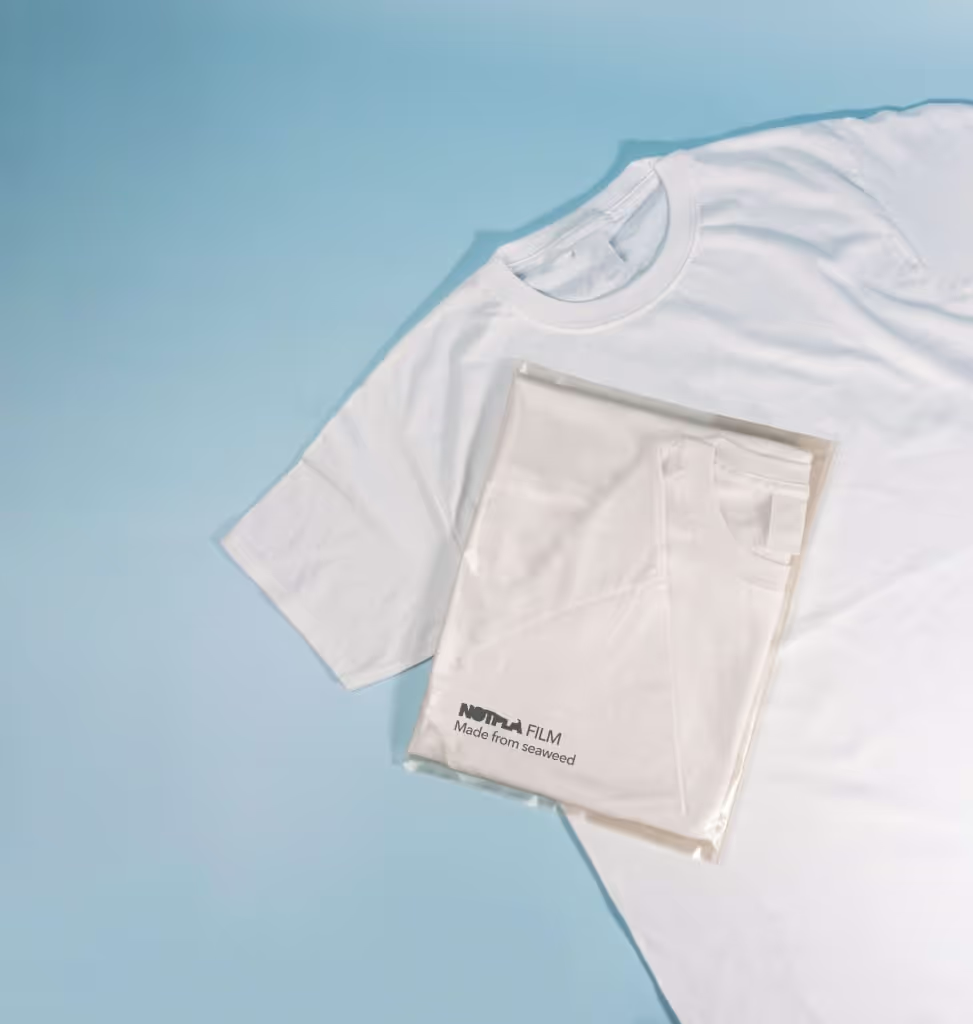
Imagine a packaging that could disappear and cause no harm to the environment …
Notpla Film went through a rigorous nine-month material testing process, sponsored by Nike, to ensure our material is biologically degradable, minimises negative social and environmental impacts, meets industry performance standards, and is also cost-competitive, scalable and market-ready by 2025.
The details of the criteria were the following:
The testing phase included field testing in Caribbean waters, in-lab testing led by the New Materials Institute at the University of Georgia, and field testing in Pacific Northwest waters led by the Seattle Aquarium. The Aquarium also led a bespoke, first-of-its-kind laboratory-based modeling designed to approximate the effect of the materials on the health and well-being of marine mammals. Yes, our material ended up in a simulated whale's gut at the Seattle Aquarium!
"Biologically degradable means it could degrade without harm to the environment on land and in the ocean, and if the unthinkable happens and it was ingested by a sea creature, we want to know that it would safely pass through." Dr. Dune Ives, CEO of Lonely Whale.
As one of the Prize winners, Notpla Film was recognised as a packaging solution that makes this a reality, by biologically degrading!
"Partnering with Lonely Whale to conduct rigorous lab and field testing for the TOM FORD Plastic Innovation Prize was an important opportunity to showcase and advance the material testing standards necessary to ensure alternatives to traditional plastics are not just marketing wins, but are truly marine-safe and biologically degradable," said Jason Locklin, Ph.D. and Director, New Materials Institute at the University of Georgia. "The New Materials Institute was proud to play a role in blindly assessing each of the Finalists' alternative materials and I am excited to follow the winning teams' success."
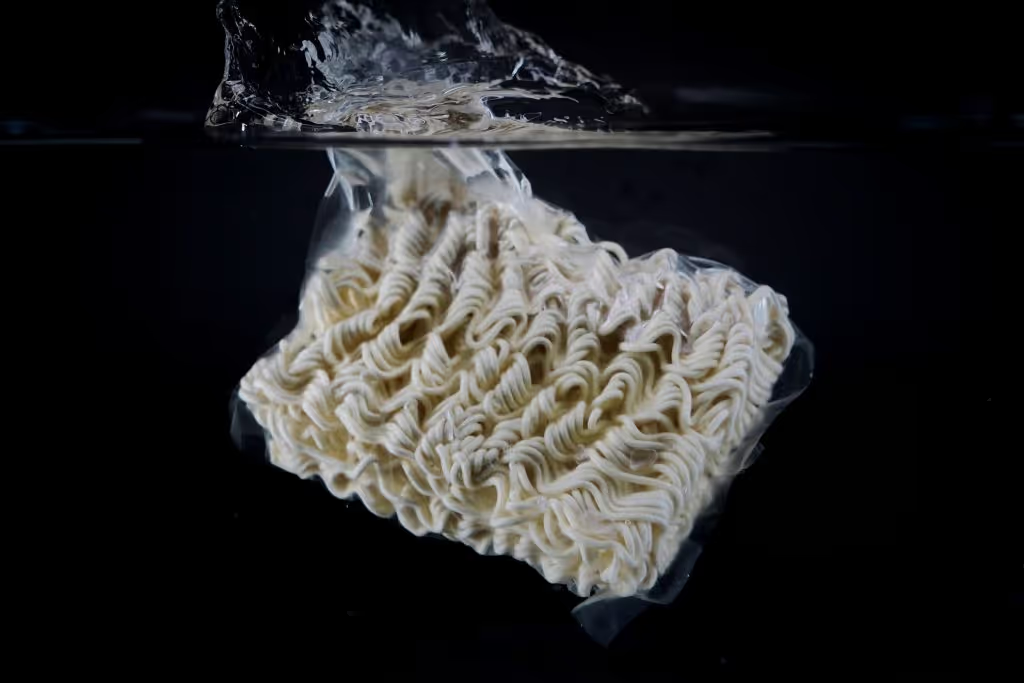
We are grateful to be a winner of the TOM FORD Plastic Innovation Prize, together with Sway and Zerocircle. This represents a tremendous recognition of the work of our team to fulfil our mission to make packaging disappear! This also put us in an excellent position to scale our Notpla Film.
"It is an honour to be recognised as a TOM FORD Plastic Innovation Prize winner amongst this international group of entrepreneurs developing solutions to traditional thin-film plastic. We look forward to the forthcoming innovation accelerator and expanding our impact across the market."
- Pierre Paslier, Notpla Cofounder & Co-CEO
If you are a fashion company interested in exploring innovative alternatives to traditional polybag for your large supply-chain, please contact us!
We are also exploring other applications where Notpla Film could represent a great alternative to traditional flexible film; such as detergent and dishwater tablets, stock cubes or cosmetic samples. If you would like to investigate these opportunities further for your business, don't hesitate to contact us too, and we will introduce you to our Notpla Innovation Lab team!
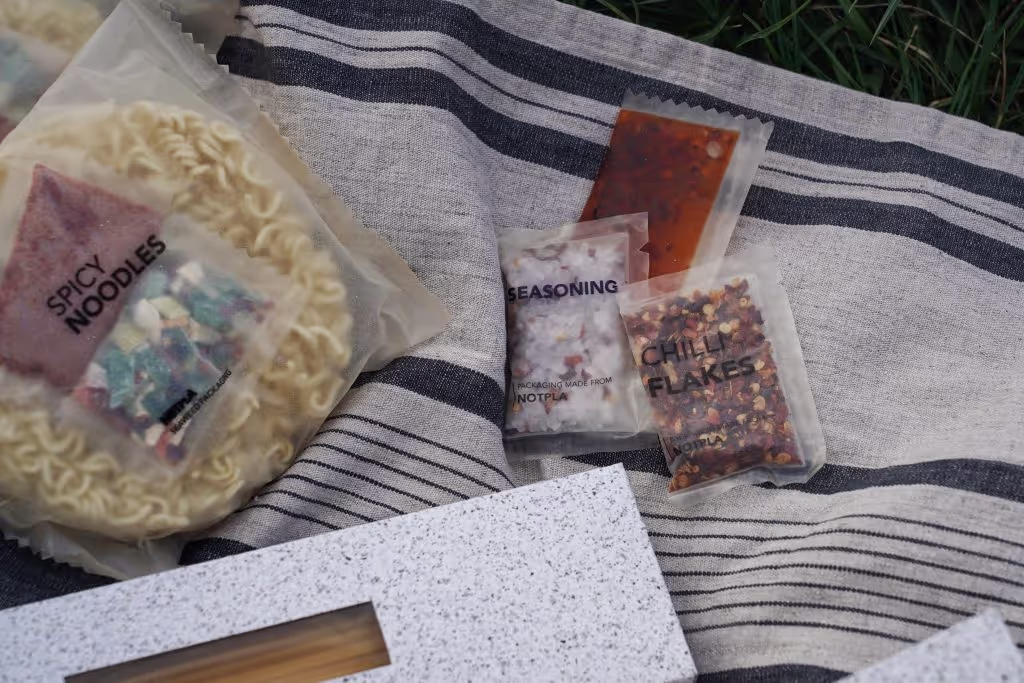
%20(1).avif) From student idea to sustainable solution: Earthshot Prize-winner Notpla returns to Imperial College London
From student idea to sustainable solution: Earthshot Prize-winner Notpla returns to Imperial College London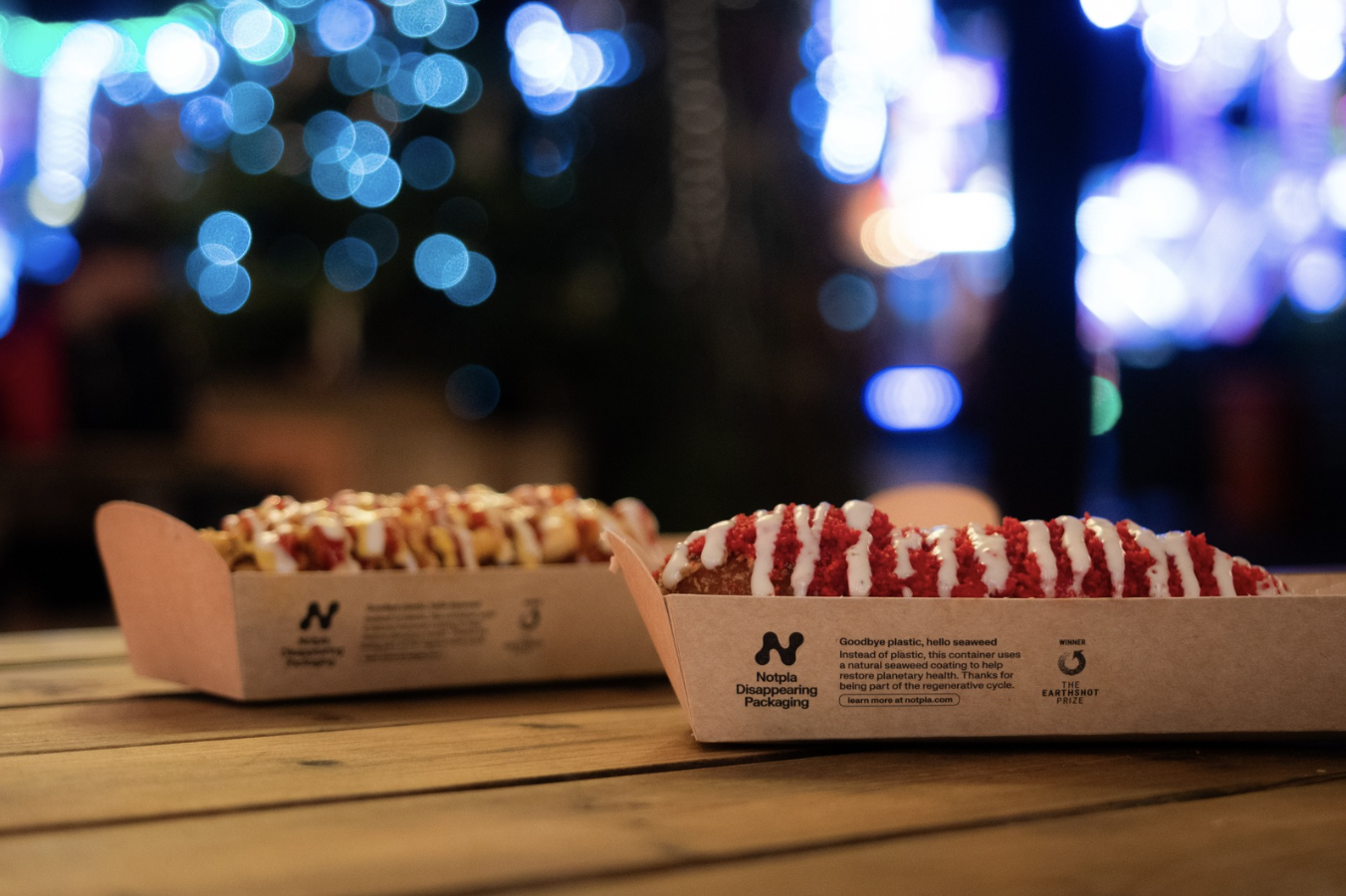 How Peppermint and Notpla redefined sustainability at Winter Wonderland
How Peppermint and Notpla redefined sustainability at Winter Wonderland.avif) Wembley Stadium partners with Notpla and Delaware North to advance sustainable packaging in live music
Wembley Stadium partners with Notpla and Delaware North to advance sustainable packaging in live music